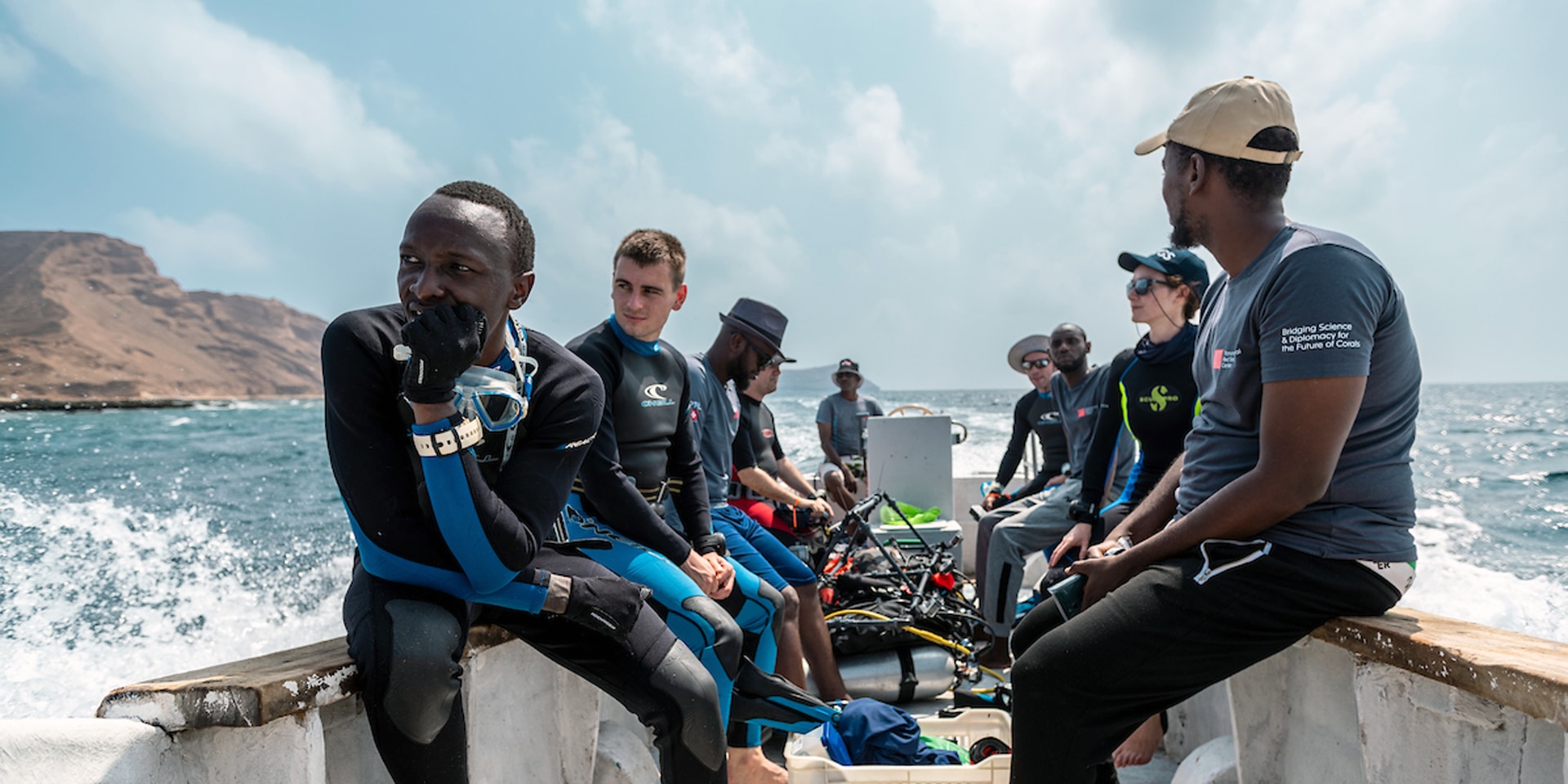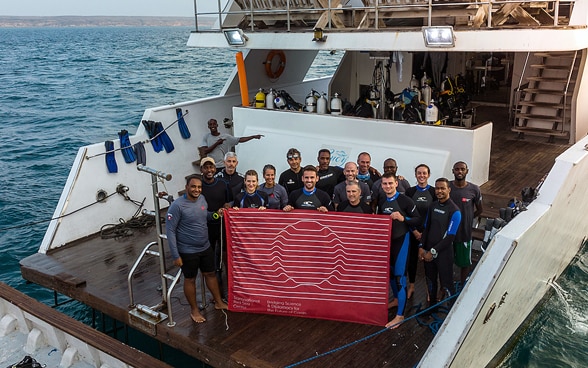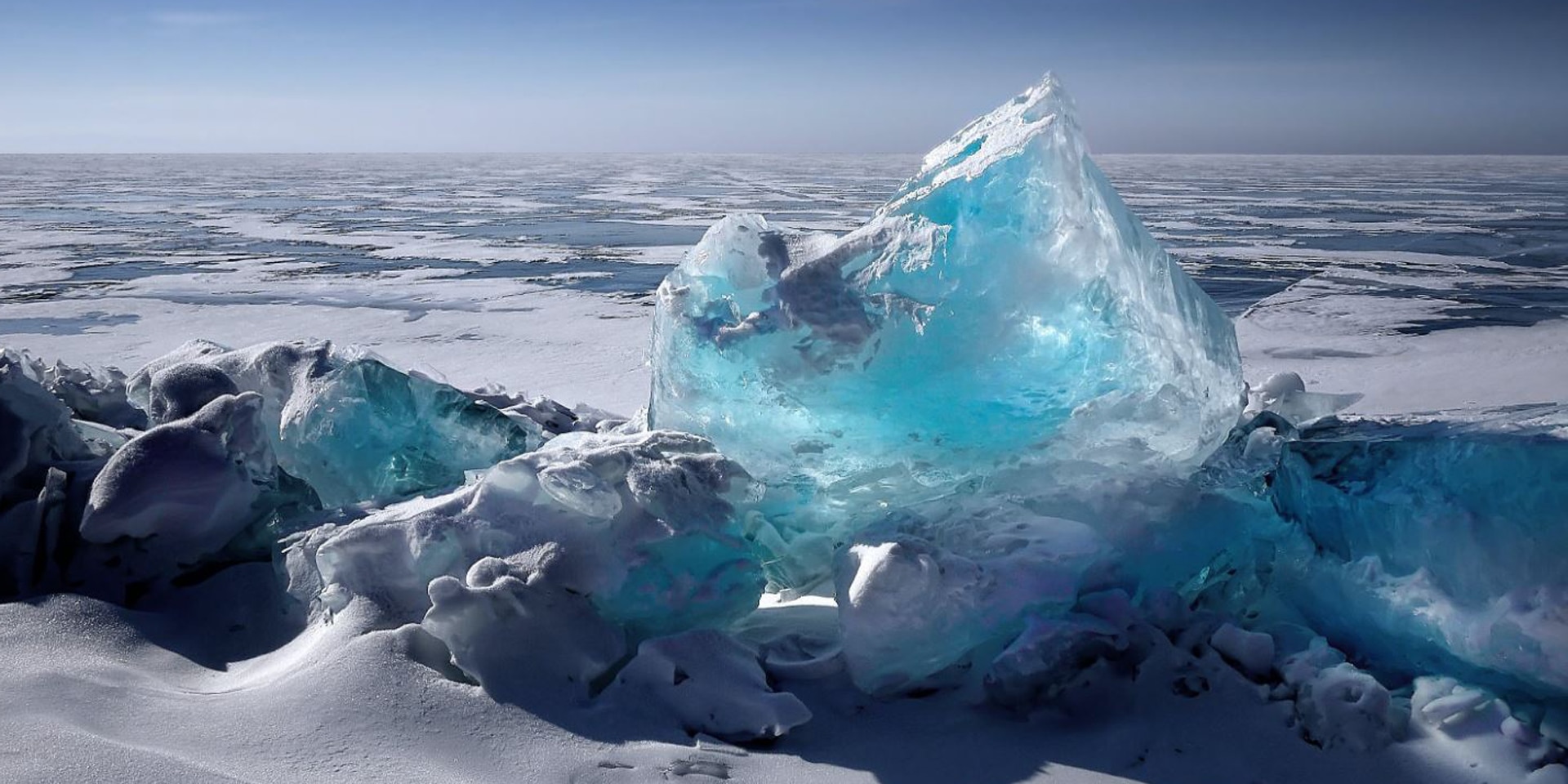Coral reefs as bridge-builders
The fourth summit of the Geneva Science and Diplomacy Anticipator (GESDA) foundation will take place in Geneva from 9 to 11 October 2024. Under the motto 'The Great Acceleration', the impacts and possibilities of rapid scientific progress on diplomacy, the environment, the economy and society will be discussed. Using the example of the Transnational Red Sea Center, the role of science diplomacy in the implementation of global environmental goals will be explored in depth.

Scientists from the Transnational Red Sea Center on a field mission in Djibouti. © Ulrika Larsson - LWimages Studio 2024
Corals in the Red Sea show exceptional resilience to climate change and the associated global warming. Their resistance to rising water temperatures makes the corals of the Red Sea a unique natural phenomenon. The global coral population is endangered. In the last 30 years, 50% of the world's coral population has disappeared due to global warming, pollution and other human impacts.
The diversity of corals is not limited to the variety of species found in the reefs, but is also reflected in the different functions of the coral reefs. These help to regulate the CO2 content in the atmosphere by storing carbon in the form of limestone. At the same time, they act as natural barriers against storm surges and flooding.
Transnational Red Sea Center
Coral reefs now also serve as bridge-builders between diplomacy and science – a relatively new role that can be traced back to the waters of the Red Sea and to Switzerland. In 2019, the Transnational Red Sea Center (TRSC) was established at EPFL with the official support of the FDFA. Deepening our understanding of the biological mechanisms that make Red Sea corals more resilient to climate change could serve to recolonise reefs worldwide. The research centre will also facilitate collaboration between scientists in the wider region.
The TRSC is an example of diplomacy and science coming together to promote transboundary cooperation in coral reef conservation, particularly in politically sensitive regions such as the Red Sea. The FDFA supported the TRSC in its interactions with the authorities of the Red Sea countries within the framework of the organisation, in conducting the necessary scientific field research and in sharing the results with all stakeholders. Where necessary, Switzerland supports the institutions concerned in developing and implementing strategies to protect coral reefs. Five of the eight countries on the Red Sea (Djibouti, Eritrea, Israel, Jordan and Sudan) have so far been included in the dialogue and activities such as field missions and educational workshops.

At the 2024 GESDA Summit (see info box below), the TRSC will also be on the agenda: during the plenary session 'Bridging Science and Diplomacy for the Future of Corals', findings and experiences of international cooperation will be collected and analysed for future collaborations. Switzerland's efforts in the field of science diplomacy and coral protection will be presented by Alexandre Fasel, state secretary of the FDFA.
For the fourth consecutive year, the 2024 GESDA Summit will bring together around 1,000 scientists, diplomats and representatives from the philanthropic and private sectors in Geneva. Under the motto 'The Great Acceleration', the acceleration of science and its applications will be explored, which should contribute to finding solutions to global challenges. Federal Councillor Ignazio Cassis, the head of the FDFA, will chair the summit's political discussions on 11 October. The central theme of this high-level segment will be the democratisation of science literacy.
Science is foreign policy
Switzerland's support for the TRSC is an example of how small nations can use science diplomacy to advance global environmental goals. As an innovative country, Switzerland has the means and the credibility to act as a facilitator and promote such a dialogue. A strong Swiss presence in the relevant forums and the strengthening of effective multilateralism are essential for the representation of Switzerland's interests. Science diplomacy not only strengthens Switzerland's international reputation and competitiveness, but can also make an important contribution to diplomatic endeavours in the context of good offices and peacebuilding.
GESDA
The Geneva Science and Diplomacy Anticipator (GESDA), an independent Swiss foundation, was initiated in 2019 by the Swiss federal government, the City of Geneva and the Canton of Geneva. The foundation not only enables scientists and diplomats to work together, but also involves representatives of the private sector and civil society in finding solutions. The aim is to work together to find ways of addressing current and future technological challenges and to use the resulting scientific and technological progress for global sustainable development.



